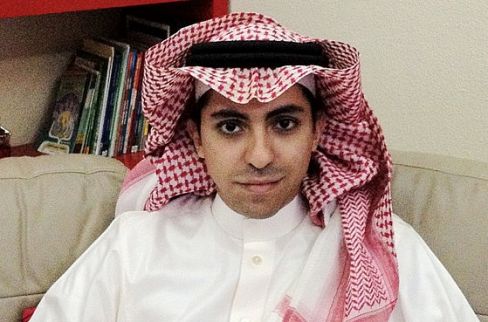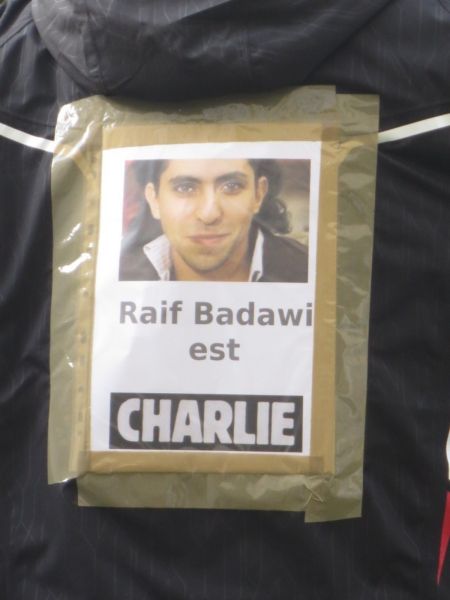The Fate of Badawi


[Originally posted here]
With Saudi Arabia’s King Abdullah bin Abdulaziz al Saud laid to rest on Friday, a first test the direction the kingdom could take under his successor, his younger half-brother King Salman, may be how it treats a dissident blogger, Raif Badawi.
On January 7th, 2014, shortly after the massacre at the Charlie Hebdo offices in Paris, with the health of King Abdul Aziz—known for his liberalizing efforts at the peak of his power—already precarious, Saudi officials denounced the attack as a “cowardly terrorist act, which Islam as well as other religions reject.”
The Saudi regime’s statement was intended to display an open stance on freedom of expression, in line with its Western allies. Two days later in Saudi Arabia, a crowd formed outside Jeddah’s Al-Jalafi mosque, where Raif Badawi received the first 50 of 1,000 lashes. Badawi, who was convicted of spreading liberal ideas and criticizing the government online, was also fined 1 million Riyals ($266,666) and received a 10-year prison sentence. Yet Philip Luther, Director of Amnesty International’s Middle East and North Africa program, contends Badawi is “guilty of nothing more than creating a public forum for discussion and peacefully exercising the right to freedom of expression.”
Saudi Arabia’s contradictory behavior of international proclamations of tolerance combined with repressive domestic policies in the same week left the international community perplexed about where Riyadh actually stands on free speech issues. As the home of Islam’s two most holy sites—Mecca and Medina—and the West’s most significant ally in the Middle East, Saudi Arabia began facing unprecedented pressure to lead by example and end its diplomatic doublespeak. On Friday, January 16, authorities postponed the next stage of Badawi’s sentence, suspending the second set of 50 lashes for medical reasons, which galvanized a number of Nobel Prize Laureates to urge Riyadh’s intelligentsia to “argue for the freedom of dissent.”
Earlier this week, before King Abdullah’s death, Saudi officials postponed Badawi’s sentence once again, though his original sentence called for the 1,000 lashes to be administered 50 at a time for the next 20 weeks. Such treatment is typical of corporal punishment in Saudi Arabia, and conveniently affords the regime many opportunities to renege on their brutality. Now it remains to see how King Salman handles this delicate matter going forward.
According to Said Boumedouha, deputy director of the Middle East and North African program at Amnesty International, “Raif Badawi is still at risk. There is no way of knowing whether the Saudi Arabian authorities will disregard the medical advice and allow the flogging to go ahead.”
Yet what is most remarkable about the Badawi case is that Saudi Arabia is suddenly being forced to take action against the same radicalism so deeply entrenched in its own system that the Saudis have demanded fellow moderate Islamists address abroad. As with neighbors they are so quick to condemn, Saudi Arabia’s cognitive dissonance when it comes to human rights can hardly be undone by the reversal of punitive sentences.
Badawi is just the most recent example of the harsh penalties levied by the Saudi regime upon peaceful activists and dissidents. In July, authorities sentenced Badawi’s lawyer, Waleed Abu al-Khair, to 15 years in prison for criticizing the kingdom’s human rights abuses. Meanwhile human rights activist Fadhil al-Manasif faces 14 years in prison, charged with assisting international media coverage of Shia protests. In November, Mikhlif al-Shammari, another human rights activist, was convicted and sentenced to two years in prison and 200 lashes for visiting prominent Shia figures in the eastern province. Overall, Sharia courts in Saudi Arabia have sentenced five pro-democracy activists to death since the beginning of 2015 alone.

Saudi Arabia consistently carries out such punishments for dissidents under an officially codified system of Sharia law derived from the Wahhabi school of Islam, which falls far below international standards for human rights. A report from the 2002 United Nations Committee Against Torture reiterated that Saudi Arabia’s use of corporal punishment (including flogging and amputations) is, “not in conformity with the [human rights]convention.” The Cingranelli-Richards (CIRI) Human Rights Dataset, which examines quantitative data and variables on countries’ human rights practices, also displays Riyadh’s poor record. In three categories—political imprisonment, freedom of speech, and freedom of religion—Saudi Arabia received the lowest possible score.
In turn, the kingdom’s critics cite these transgressions as central to their opposition. The Saudi government may try to silence its detractors with repressive tactics, but doing so has only been met with increased resistance both at home and abroad.
Gary Sick, a research scholar at Columbia University’s Middle East Institute, believes the kingdom is caught between a rock and a hard place while trying to save face with their Western allies without uprooting their entire legal system. “The fundamental dilemma, from a policy point of view,” says Sick, “is whether Saudi Arabia is prepared to put the kind of moral, spiritual, and financial effort into defeating this perverted ideology that it did in nurturing and propagating it.”
Wahhabi ideology is at the heart of most, if not all, radicalized thought in the Muslim world, and Riyadh has been successful in exporting its version of Sunni Islam to the region. As the guardian of Mecca and Medina, the de facto government of Sunni Islam, and the protector of Gulf monarchies, Saudi Arabia carries great influence over broader Muslim trends and standards.
“All of the countries in the Middle East need to do more to promote the common welfare of the people,” says State Department official, Robert Dry. Though Dry does not see democracy coming to the kingdom anytime soon, ending cruel and unusual punitive measures against democratic activists could transcend regional borders and help bring greater stability throughout the Middle East. Dry suggests the Tunisian model for democracy may be one that Saudi Arabia could embrace in the long run, asserting “they’re [Tunisia] on the right path.”
While a more open Saudi Arabia would win the kingdom and its new, younger ruler more international credibility outside the West and ease internal tensions with democratic and liberal opposition movements, the question remains of how the monarchy can implement such progress. The death of King Abdullah opens some possibilities, if difficult to define so early on in the transition process. Such changes can also be influenced by the West and materialize from a new, moderate, interpretation of Islam, one that discredits the strict Wahhabi way of thinking – an action which Riyadh and its new leadership may not embrace. A U.N. commission like the International Commission of Inquiry on Human Rights Abuses in the Democratic People’s Republic of Korea could be both politically and strategically effective if Saudi Arabia continues to ignore the calls for tolerance.
Jordan Clifford is a graduate student at NYU pursuing an MA in International Relations. Jordan’s work focuses on MENA security and culture. He works at International Politics Review, World Policy Institute, and the Center for Behavioral Research at NYU Stern.




